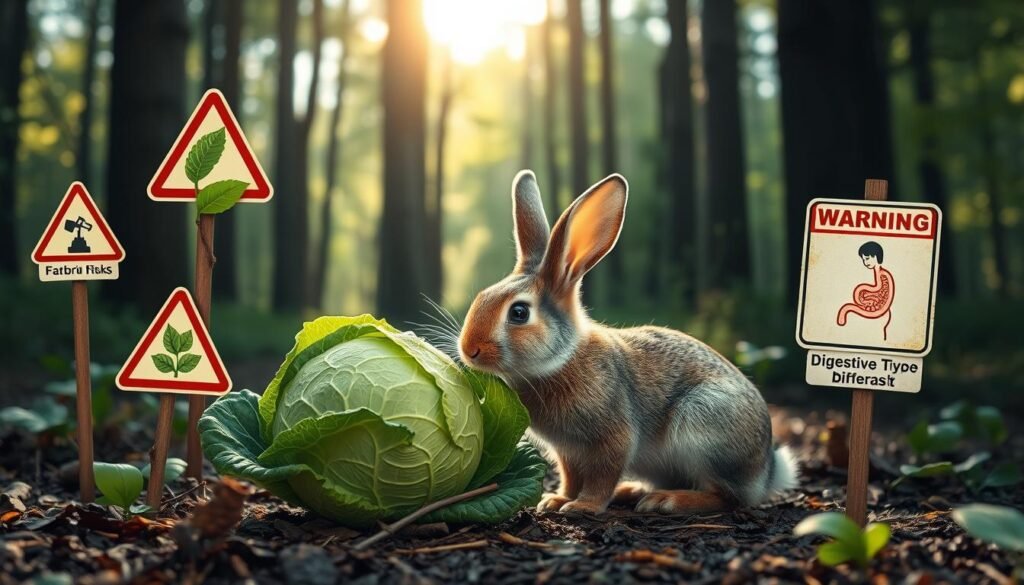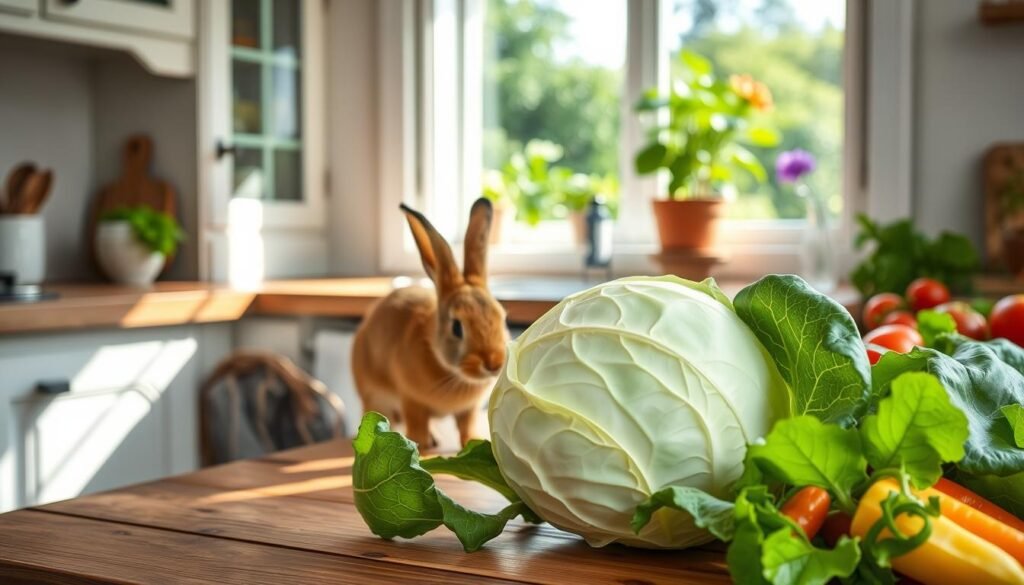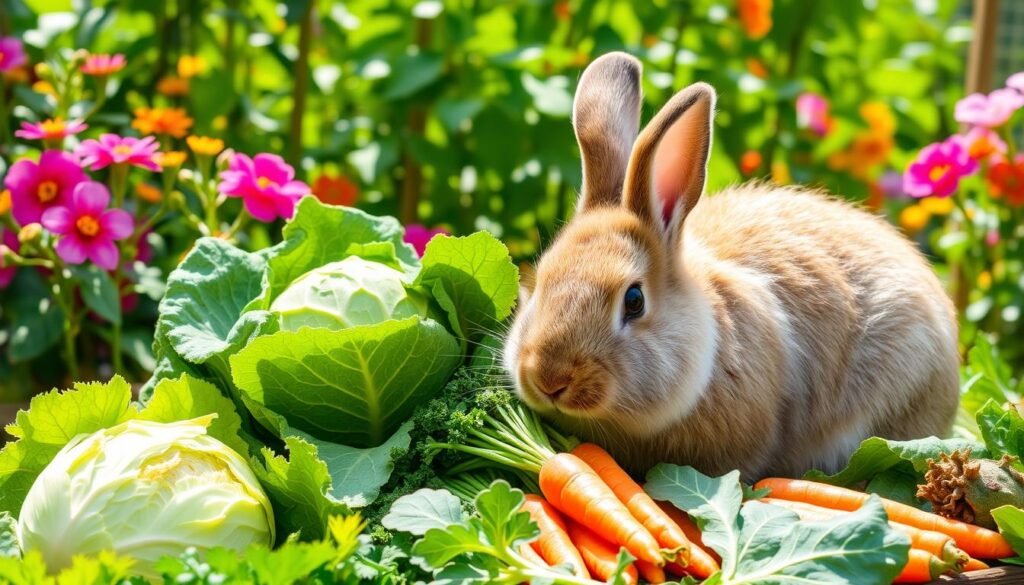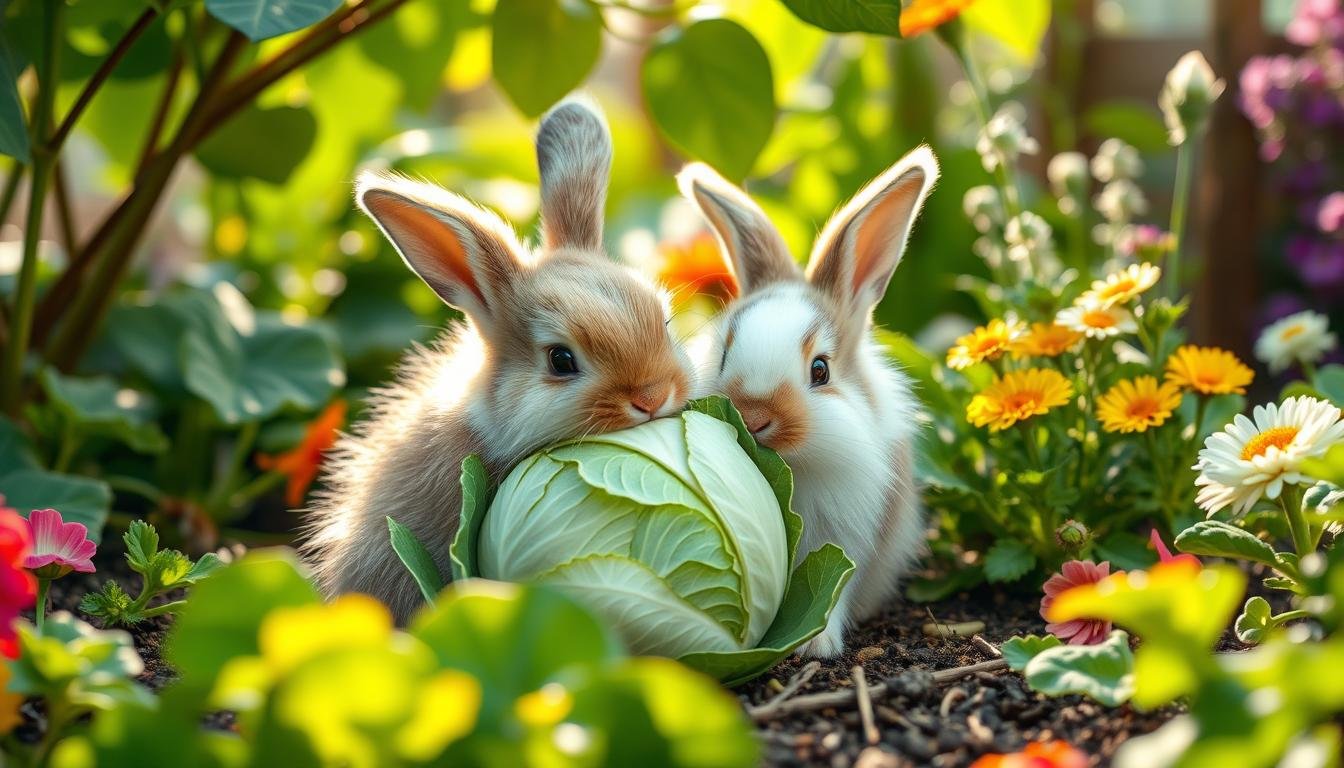As a rabbit owner, I’ve often wondered if I can share my favorite cabbage with my furry friend. It turns out, knowing how rabbits and cabbage interact is key for their diet and safety. Old Farmer MacMillan’s story shows how rabbits can threaten all crops, potentially eating up to 100% of his yield1.
This experience stresses the need to think about whether rabbits can eat cabbage and how safe it is for them.
Feeding cabbage to rabbits comes with both risks and benefits. I’ll dive deeper into this topic to give you a full picture of cabbage safety and its role in a rabbit’s diet.
Key Takeaways
- Understanding the relationship between rabbits and cabbage is crucial for their diet and cabbage safety.
- Considering can rabbits eat cabbage is essential for a rabbit diet.
- Cabbage safety should be a top priority when introducing cabbage to a rabbit’s diet.
- A rabbit diet should include a variety of vegetables, including cabbage, to ensure a balanced diet.
- Researching the potential risks and benefits of feeding cabbage to rabbits is vital for their health and cabbage safety.
- A rabbit’s diet should be tailored to their individual needs, including considering can rabbits eat cabbage.
- Consulting with a veterinarian is recommended to ensure a rabbit’s diet is well-balanced and safe, including cabbage safety.
Understanding the Relationship Between Rabbits and Cabbage
Exploring rabbit nutrition, I find the bond between rabbits and cabbage intriguing. Cabbage offers many benefits, crucial for rabbit health. It’s key to know how this veggie impacts their well-being2. shows that hay and grass should make up 70% of a rabbit’s diet for health. Yet, cabbage can be a great addition.
Rabbits love cabbage for its crunchy texture and sweet taste. There are many cabbage types, each with its own nutritional profile. A diet that includes cabbage can give rabbits the vitamins and minerals they need3. But, it’s important to introduce cabbage slowly to avoid digestive problems.
Here’s a quick look at the nutritional values of different cabbage types:
| Cabbage Type | Vitamin Content | Mineral Properties |
|---|---|---|
| Green Cabbage | Rich in Vitamin C and K | Good source of potassium and manganese |
| Red Cabbage | High in Vitamin C and antioxidants | Rich in fiber and vitamin K |
| Savoy Cabbage | Good source of Vitamin C and B6 | Rich in fiber and minerals like potassium and manganese |
Understanding the bond between rabbits and cabbage helps us make better diet choices. With the right mix of cabbage and nutrition, we can ensure rabbits stay healthy4.
Can Rabbits Eat Cabbage: The Definitive Answer
As a rabbit owner, it’s key to think about cabbage safety and its effect on your pet’s rabbit diet. Many pet owners and vets have debated if rabbits can eat cabbage. Let’s look at the good and bad sides of giving cabbage to rabbits. Cabbage is full of vitamins A, C, and K, which are good for rabbits’ health5.
A good rabbit diet has many vegetables, and cabbage is a good choice in small amounts. But, start with a little cabbage to avoid stomach problems. Watch for signs like diarrhea or gas5. Cabbage’s fiber helps prevent stomach problems and keeps rabbits from getting too fat5.
Here are some key points to consider when feeding cabbage to your rabbit:
- Cabbage should be given in small amounts to avoid digestive issues5.
- Red cabbage is known to cause gas and bloating, while green cabbage is recommended5.
- Cabbage consists of approximately 92% water, aiding in rabbit hydration5.
In conclusion, rabbits can eat cabbage as part of a balanced rabbit diet. But, remember cabbage safety and start slow to avoid stomach problems. By following these tips and talking to a vet, you can make sure your rabbit gets cabbage’s benefits without health issues5.
| Vegetable | Recommended Amount | Health Benefits |
|---|---|---|
| Cabbage | Small amounts | Nutrient-dense, fiber content, and hydration |
| Kale | 21 grams | Rich in vitamins A, C, and K, and fiber6 |
Nutritional Benefits of Cabbage for Rabbits
Cabbage is a nutritious veggie that’s good for rabbits. It helps their digestion with lots of fiber content7. It’s also packed with vitamins and minerals, making it a great food for rabbits8. Eating cabbage can boost a rabbit’s health, giving them a strong immune system and healthy digestion9.
Cabbage has vitamins A, C, and K, and minerals like calcium and potassium7. It’s also very wet, helping rabbits stay hydrated8. To get the most benefits, rabbits should eat cabbage slowly and in small amounts9.
Here is a summary of the nutritional benefits of cabbage for rabbits:
| Nutrient | Benefit |
|---|---|
| Fiber | Supports digestive health |
| Vitamins A, C, and K | Supports immune system and overall health |
| Minerals like calcium and potassium | Supports healthy digestion and overall health |
| High water content | Helps keep rabbits hydrated |
Potential Risks and Side Effects
Feeding cabbage to rabbits can pose some risks and side effects, including cabbage risks and rabbit health risks10. Cabbage has high levels of oxalates, which can cause digestive problems if eaten too much10. Also, eating too much cabbage can harm a rabbit’s kidneys and may lead to bladder issues10.
To avoid these problems, it’s important to add cabbage to a rabbit’s diet slowly and in small amounts. A good rabbit diet mainly includes hay, with veggies like cabbage given sometimes10. Keep an eye on your rabbit’s health and behavior, looking out for signs of digestive trouble like gas, bloating, or diarrhea10.
Here are some tips to reduce the risks of feeding cabbage to rabbits:
- Introduce cabbage gradually and in small amounts
- Monitor a rabbit’s behavior and health closely
- Provide a balanced diet that includes a variety of fresh vegetables and hay

By following these tips and knowing the potential risks, you can ensure your rabbit stays healthy and safe. This way, you can still give them the good stuff from cabbage10.
| Risk | Description |
|---|---|
| Digestive issues | Gas, bloating, diarrhea |
| Kidney stress | Bladder sludge or urinary stones |
How to Properly Prepare Cabbage for Your Rabbit
Preparing cabbage for your rabbit is key to their health. It’s a nutritious part of their diet. Choose fresh, green cabbage to avoid gas and bloating issues11.
Washing and drying the cabbage is crucial. This removes dirt and harmful substances. Also, feed cabbage in small amounts to avoid digestive problems11.
Here are some tips for preparing cabbage for your rabbit:
- Wash the cabbage leaves thoroughly with clean water
- Dry the leaves to prevent moisture accumulation
- Chop the cabbage into small, manageable pieces
- Introduce cabbage gradually into your rabbit’s diet to monitor for signs of digestive upset
By following these guidelines, you can ensure your rabbit’s health when introducing cabbage11.
Best Practices for Introducing Cabbage to Your Rabbit’s Diet
When adding cabbage to your rabbit’s diet, start slow. This lets their digestive system get used to it12. A slow introduction helps avoid problems like diarrhea or bloating. Watch your rabbit’s health closely and adjust as needed.
Start with a little cabbage and slowly add more. This helps their body adjust to the new food. Also, make sure they have a balanced diet with hay, water, and quality pellets12.
Some important things to remember when adding cabbage to your rabbit’s diet include:
- Start with small amounts and gradually increase the serving size
- Monitor your rabbit’s health and adjust the introduction process as needed
- Introduce cabbage in conjunction with a balanced diet
Introducing cabbage to your rabbit’s diet needs patience and careful planning. By following these tips, you can make the transition smooth and keep your rabbit healthy and happy. Remember, a well-planned rabbit diet introduction is key, and cabbage can be a great addition12.

Signs Your Rabbit Is Enjoying Their Cabbage
As a rabbit owner, watching your pet’s behavior and health is key when introducing new foods like cabbage. A sign they like cabbage is if they eat more and seem more energetic9. But, look out for signs like digestive problems, feeling tired, or changes in how they act13.
A happy rabbit will show signs like being excited and eager to eat cabbage6. But, watch for signs of trouble like too much gas, feeling bloated, or stomach pain9.
To make sure your rabbit enjoys cabbage safely, add it slowly and in small amounts. Make sure their diet is balanced with lots of hay, grass, and a little bit of fresh veggies6. By watching how they act and adjusting their diet, you can keep them healthy and happy with cabbage13.
Some important things to remember when giving cabbage to your rabbit include:
- Start with small amounts and gradually increase the serving size
- Monitor your rabbit’s behavior and health closely
- Ensure a balanced diet that includes plenty of hay, grass, and limited fresh vegetables
By following these tips and knowing the signs ofcabbage enjoymentand potentialwarning signs, you can help your rabbit get the good stuff from cabbage without any bad side effects9.
Combining Cabbage with Other Vegetables
Creating a balanced diet for your rabbit is easier with cabbage and other veggies. I look for vegetable combinations that are safe and healthy. Over 200 wild plants can be good for rabbits, but not all are safe14. It’s key to pick compatible vegetables that go well with cabbage and offer health benefits.
My rabbit meal planning includes hay, water, and veggies like cabbage, kale, and carrots15. I also add spinach, carrots, parsley, and cilantro for variety. When introducing new veggies, start small and increase the amount as your rabbit gets used to it15.
Here are some tips for combining cabbage with other vegetables:
- Choose veggies high in fiber and low in sugar
- Avoid mixing too many veggies at once to prevent digestive issues
- Consider adding herbs like parsley and cilantro for their medicinal properties

By following these tips and considering the nutritional benefits of different vegetable combinations, I can create a balanced diet for my rabbit. Always prioritize your rabbit’s health and safety when introducing new foods. If you have concerns, consult with a vet14.
| Vegetable | Nutritional Benefits |
|---|---|
| Cabbage | Rich in vitamins A, C, and K |
| Kale | High in fiber and antioxidants |
| Carrots | Rich in vitamin A and fiber |
Alternative Leafy Greens for Your Rabbit
As a rabbit owner, it’s key to give your pet a varied diet. This should include many alternative leafy greens for their health. About 80% of a rabbit’s diet should be hay or grass, with 20% being leafy greens16. Safe greens for rabbits include kale, spinach, and romaine lettuce17.
Rabbits also enjoy other veggies like carrots, bell peppers, and cilantro17. But, introduce new foods slowly to avoid stomach problems. Start with a small amount of new foods, like cauliflower, once or twice a week17.
It’s important to think about the nutrients in the foods you give your rabbit. For example, 100 grams of raw cauliflower has 25 kcal, 92% water, and 2g of fiber17. A balanced diet with different leafy greens helps your rabbit stay healthy.
| Leafy Green | Nutritional Content | Recommended Serving Frequency |
|---|---|---|
| Kale | High in vitamins A, C, and K | Daily |
| Spinach | Rich in iron and calcium | Daily |
| Romaine Lettuce | Low in calories, high in water content | Daily |
Conclusion: Making Cabbage a Healthy Part of Your Rabbit’s Diet
Cabbage can be a great addition to your rabbit’s diet, offering many health benefits12. It can make your rabbit’s meals more enjoyable and support their health. Start by adding cabbage slowly and watch how your rabbit reacts, as some may have sensitive stomachs12.
For a healthy rabbit, a balanced diet is key. This includes lots of fresh veggies, unlimited hay, and a bit of pellets2. Cabbage can be a tasty and healthy choice for your rabbit’s meals12.
Regularly adding cabbage to your rabbit’s diet can give them important nutrients and fiber12. It also helps keep them hydrated. Always talk to your vet to make sure your rabbit is getting the right food and to answer any questions2.

